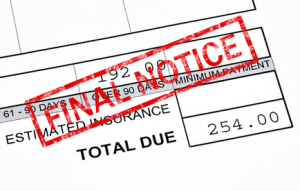
What do you do? How to do you approach the person or entity that owes you money?
The best thing to do is initiate formal communication, in writing, with a demand letter. This can be best drafted by your attorney, but you can likely handle it yourself if you haven’t one. A simple search will show you good examples of this kind of letter.
While this letter doesn’t have any legal “weight” in the sense that the other party is any more obligated to pay their outstanding debt than before, it may be enough to get a certain kind of debtor to pay up. One or several letters does succeed in letting you set the tone for what is to come. The other party will know where you stand and will be much likelier to take you seriously.
If you set up the right kind of contract with the other party in the first place, there will be a clause in place about litigation. If they default, basically, they will have to pay your court and legal fees, in addition to their own, in the event that you sue. That’s a lot of money to avoid paying back money, so many lendees will back down at this point, settling with you out of court. This is the sensible thing to do anyway, and you never know how a party will react.
If you don’t have this kind of legal recourse, you’ll do well to hire a lawyer who specializes in small business cases, or hire a collection agency. There are different kinds of collection agencies, ones that buy your debt from you and others that coerce the other party into servicing their debt, and then taking their fee from that amount. Know all of the details before you bring one of these on board.
One tricky issue to consider is that many fee-based collection agencies will take about 30% of the amount that you are owed. This holds true, even if they are unable to collect the full amount. For example, if someone owes you $1000, and the collection agency collects only $600, they’ll still take $300. Not every collection agency that you hire works this way, and you’ll want to do due diligence to anticipate all factors, but these are things you should look for going in when hiring a collection agency.
Finally, collection agencies can come in handy if you have sued for an amount but the party is still not getting your the money. This changes things. Essentially, your debt is “worth more” now because there has been a judgment establishing its validity. You can choose to sell your debt to your collection agency or work out a different rate for them to work. It’s best to consult a lawyer uninvolved with your particular situation to iron out the details of a situation like this.
Payments aren’t always honored. It’s the sad truth. If you find yourself waiting on an outstanding invoice from a shady party, look at your options. There are things you can do before hiring a lawyer or collection agency. But some situations really call for their involvement. Make the most informed decision you can, and we wish you the best in recovering the money you are owed.

Unfortunately, I had to go through the whole small claims court and judgment collection process several years ago to try to collect damages from the woman who ran me over. Winning the judgment was easy, the collection was impossible. Never saw a cent of it, despite my pessimal collection attempts as well as those of a collection agency.
Even though my debtor was impossible (welfare, no assets), the books from Nolo press for small claims court and collecting a judgment were a huge help. Can’t recommend them enough
For someone that is having trouble paying off certain debts, what can a collection agency do for the individual? That’s something that is happening with my wife and I. The both of us are thinking about reasoning with an agency like that so they can give us some time to pay the debt that we owe them.